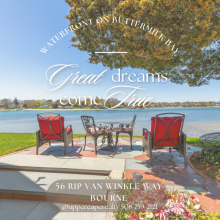Casino, racetrack face hurdles
The developers of the casino and racetrack proposed for Wareham face a number of regulatory challenges before the ground can be broken at the site between Glen Charlie Road and Route 25.
First on the agenda is passing legislation through the Massachusetts legislature.
Massachusetts law allows for three casinos in the state, one in each of three regions. The other two regions already have casinos: Encore Boston Harbor in Everett, which opened on June 23, and the MGM Springfield in Springfield.
The state’s Expanded Gaming Act also created one license for a slots-only facility with no table games. That license is held by Plainridge Park Casino in Plainville.
The law also sets out a variety of criteria that developers of a proposed casino must meet: a minimum licensing fee of $85 million, a capital investment of at least $500 million, and inclusion of a hotel.
Because Notos Group, the developers of the proposed project, do not want to include tables games and are looking to spend only $300 million, the law must be changed for the project to go forward.
Attorney Jeffery Tocchio, a spokesman for the project, explained that the developers are looking for the legislature to give the Gaming Commission, which is the authority that awards casino licenses, the ability to “right-size” the license and allow smaller projects to apply and compete for the license.
Developer Tom O’Connell said that this is the biggest hurdle the project faces.
State Senator Marc Pacheco, who represents Wareham and many of the towns in the region, is strongly opposed to the project, and believes it would deprive the region of the economic benefits of a larger casino.
“If it was just a thoroughbred track, that would be different. They’re interested in having a mini casino and having the law changed to undermine a mega destination-based casino in Southeastern Massachusetts,” Pacheco said. “I am extremely opposed to undermining the ability for our region to be treated exactly the same way as the other two regions in the state. We are not less than those other two regions. We are equal to the other two regions and we should have the same opportunity.”
If the Gaming Commission was given the authority to offer a smaller license for the region, the Wareham Park Project would then compete against other proposals.
Should it be awarded the license, there would still be several necessary steps for approval at the town level.
Town officials and the developer would need to negotiate a Host Community Agreement, which allows the town to set conditions, charge a community impact fee, and clarify the responsibilities of the town and developer.
Only after the agreement is signed may the town hold a referendum vote, which gives voters a chance to approve or deny the license. The vote would be via ballot, and the measure would need to pass with a majority vote.
Town meeting voters would also weigh in on the project. Because the land would need to be rezoned, two-thirds of voters would need to approve the zoning change.












